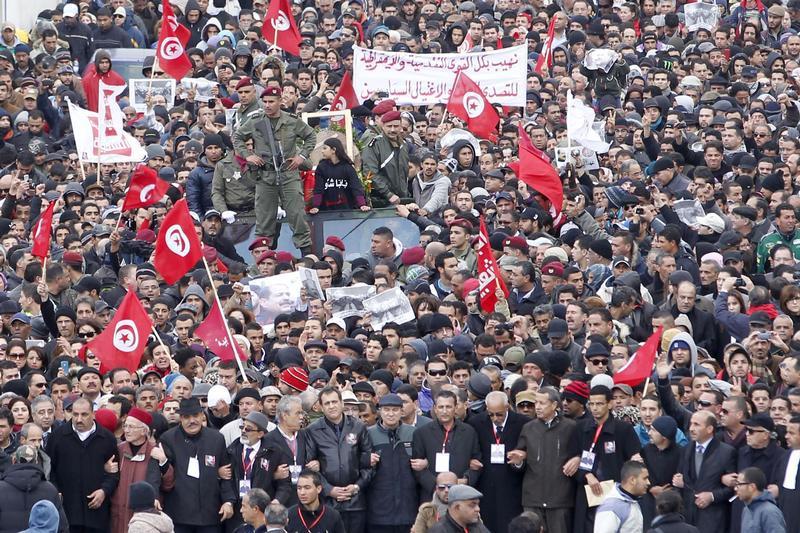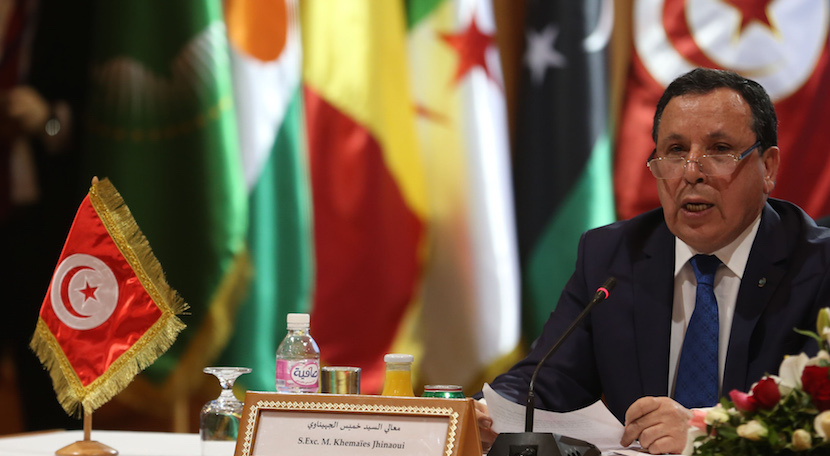This material belongs to: The Wire.
Tunisian foreign minister Khemaies Jhinaoui has returned to India for the first time since 1986. Ahead of his meeting with his Indian counterpart, he spoke to The Wire about democracy, economic growth, terrorism, and more.
New Delhi: Six years on, Tunisia remains the only democratic survivor of the Arab Spring.
Poised at a turning point, the North African Arab state has to grapple with a slow economic recovery, high unemployment and ensuring that new democratic institutions took firm hold. At the same time, Tunisia has to buckle up to the terror threat spilling over from Libya, even as hundreds of young Tunisians travelled to join the so-called Islamic State.
Tunisian government has been particularly under pressure from civil society to make serious dents in widespread endemic corruption. Corruption remains a political hot potato as it was one of the underlying causes of the Jasmine Revolution – a stark lack of economic opportunity and social dignity for the majority, while the ruling elite of Zine El Abidine Ben Ali’s regime prospered.
Earlier this month, President Essebsi Beji Caid Essebsi signed into law a controversial legislation which gave immunity to officials who had worked with the earlier regime – despite street protests from civil society. The installation of ministers from the previous dictatorship also led to allegations of impunity.
Speaking to The Wire, the Tunisian foreign minister Khemaies Jhinaoui defended the reconciliation law as necessary to remove ‘policy paralysis’ and aid economic recovery. In a wide-ranging interview, he spoke about the challenges of meeting conditions of IMF loans, terrorism and the latest round of the Libya talks.
Jhinaoui had been a career diplomat for over 37 years, before he took over his present position in January 2016. His first diplomatic posting had, in fact, been in Delhi for four years in the early eighties – during which he witnessed the NAM summit, aftermath of Indira Gandhi assassination and initial years of Prime Minister Rajiv Gandhi. His arrival to Delhi on Saturday was his first return to India after he left in 1986.
Economic and Security cooperation was the major focus of his visit to Delhi. He co-chaired the Joint Commission Meeting with Indian external affairs minister Sushma Swaraj, where they set a target to quadruple trade to $1 billion over next five years and signed six agreements.
The Wire spoke to the Tunisian foreign minister ahead of his meeting with Swaraj on Monday.
Why is Tunisia so unique? Why has it survived as the only democracy despite going through difficult, politically unstable period after the Jasmine revolution?
Tunisia is unique for the simple reason that we have different history and different geographic situation. We have history which is fundamentally characterised by reformist movement that starts in early 19th century. Few people know that, for example, Tunisia abolished the slavery in 1846, much earlier than many European nations and the United States. We had our first constitution in 1861, a unique feature in the Arab and Muslim world and even before many other western countries. So, there is a very strong legacy of reformist movements. We have one of the oldest trade unions, which was created in the forties.
When we got our independence in 1956, the new government also began with major reforms. A few days after independence, our first leader, President Habib Bourguiba, promulgated a family law which gives equal status for women and men, abolished polygamy and permitted divorce by both women and men. A few months later, we adopted an education law, which made education compulsory till the age of 16 for boys and girls.
All these reforms – I mentioned just a few of them – made Tunisian society free, liberal and open.
Add to this, our proximity to Europe. Tunisia has always has been under western influence. If you study the history of Tunisia, there is like a cascade of waves of colonisations. Of course, we had the Carthaginians, Romans, Byzantines, the Spanish, the French, the Arabs, the Muslims… all these created a kind of melting point, which is a unique character of the Tunisian people. I think these are the ingredients why Tunisia succeeded while other countries were not able to overcome the upheaval that they witnessed after 2011.
That does not mean that we are at the end of road. It means that the fundamental causes for success are there.
We have a very vibrant civil society. A large middle class and educated people… young people. But, we still have a major challenge – how to make democracy deliver the expectations of the people and particularly, young people. The young are very open to foreign influence, particularly western influence, and they would like to see the democratic system delivering to their needs – to their expectation of having a better life.
Six years on, how much of the agenda of the Revolution has been fulfilled?
I think we have achieved major steps towards having stabilised and permanent institutions. We held twice – in 2011 and 2014 – free and democratic elections. We have had successive elected governments. A president who is elected democratically. A vibrant parliament with more than ten parties represented.
We now have national unity government formed by seven parties. And we have some permanent institutions like the Independent Election Committee and (Supreme) Judiciary Council. You know, these judges are elected by parliament and women represent the majority… 18 women among 32. In Muslim Arab world, if you have more women (as judges), it is something unique. We are now in the process of finalising the constitutional court.
One of the reasons for the revolution was the that economic prosperity was being enjoyed by only a select few. The Tunisian government had announced a ‘war on corruption’ earlier this year. What was the need for it and has it been effective?
While there are successes on the political front, the country is still facing some major economic problems. And one of the reasons that the economy is not resuming its normal growth rate is because of corruption.
When the state was weakened in 2011, many private individuals took benefit of the lack of power of the state, in order to project and increase their own interests.
The task which the government is now trying to tackle is – first, how to include these informal economic sectors within the formal one. Secondly, how to fight corruption. This drive started already few months ago and is continuing.

Earlier this week, the Tunisian President signed the ‘Economic Reconciliation’ law (which gives amnesty to bureaucrats who were working with the Ben Ali regime). What is the rationale for the reconciliation law and why is it so important for the government?
This is not just a matter of corruption. After 2014 constitution was enforced, we created a Truth and Dignity Commission.
There are two schools of thought on it. One says that in order to reach reconciliation, we give full power to this Truth and Dignity Commission, which is supposed to interview all the people who were apparently involved with the old regime. The logic was they took advantage of their situation under the old regime and they have to recognise what they have done, the misdeeds they have done and ask for reconciliation.
We found that there are many high government officials within the administration, public service who got instructions from the old regime. Their only mistake was to obey the instructions. They didn’t take personally any advantage of the decision that they have made.
But, unfortunately due to Tunisian law, they had to go to the court and some of them have been sentenced to many years in jail.
Therefore, the situation today is that there are many high officials who do not want to take any decision, fearing that one day they will be questioned according to the same rule.
That’s why the president took the initiative to say that all those high officials who did not take any personal advantage, either political or material, all these people who just obeyed instructions they have to be forgiven and let free, in order to revive the economy.
Does this include people who have been convicted?
No, not convicted. This has nothing to do with the judiciary system. This is related to specific persons. There is a list of them who are working with the government public service and who were not guilty of anything, just obeying instructions which they got from the head of state or the high officials of that time.
So, now this (Reconciliation law) is to give a kind of boost to administration and encourage senior officials working today to take prompt and quick decisions in order to revive the economy.
But, Tunisia’s civil society organisations have strongly protested against this law.
They don’t like this. They say that these people have to run through the Truth and Dignity body and there shouldn’t be any exception.
This has become politicised. You know we have 214 parties today. So, they are using this kind of argument to pressure and impede the running of the coalition government.
How will the law actually give a boost to the economy?
It will boost the economy as it frees the hands of the official.
You mean to imply that there was policy paralysis earlier?
Yes absolutely. This is to tackle the paralysis which is hindering the decision making in the public sector.
Tunisia, of course, is threatened by ISIS in Libya, but you also face serious threats from Al-Qaeda affiliates in Algerian territory. Can you unpack Tunisia’s major security concerns?
Tunisia was a victim of three major terrorist attacks in 2015-16. All three were planned outside of Tunisia. They hit very badly some sensitive and important economic sectors of the country – tourism and foreign investment.
When you have the image, the perception of a country that is not secure, nobody will come either to enjoy good holidays or to invest.
Fortunately for last two years, our security forces are much better trained and much better equipped to tackle terrorism. Our forces are now preventing terrorist threats instead of just reacting to them. So, this is a major achievement that we have made in the last two years.
Besides these three terrorist attacks, many others were foiled and prevented by our forces. But, all them originate, particularly and mainly from Libya. Libya, unfortunately, is living in a very chaotic situation, where there are three governments claiming power and no one is having an effective control of Libyan territory. And we have 540 kilometres of border with Libya, which is uncontrolled. We are now installing electronic monitoring system in order to control the infiltration.
With Algeria, we have very strong cooperation going on, as we have much larger border. They have been helping us to control our borders and prevent any attacks from people using the mountains between the two countries, in order to attack and derail our political system.
In Tunisia, we are trying to build today a 21st century democratic, open, tolerant system. These people (terrorists) would like to take us back to the middle ages, in order to install a kind of caliphate. So, you see, we have difference of nearly 13 centuries from what we are trying to establish today and what these people are trying to achieve. We are their anti-model. They are doing their best to derail the first and most important experience of having a democratic system in a Muslim country. This is the first time that you have in the land of Islam, a country which is trying to espouse universal values of democracy and human rights.


